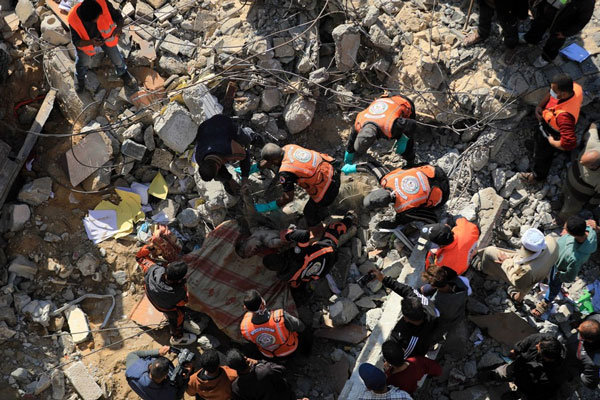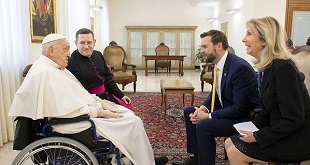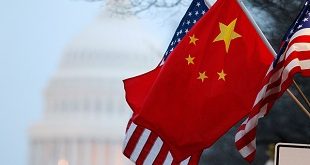
It would ensure security, work towards reconstruction and to lay the foundations for stability and development
COMMENT | JULIEN TOURREILLE | The massacre perpetrated against Israel by Hamas on Oct. 7 opened a new chapter in the tragedy that is the Israeli-Palestinian conflict.
For more than 75 years, too many opportunities to achieve lasting peace have been squandered, whether through the intransigence of some, the extremist excesses of others, the unbalanced commitment of a third party or even global disinterest in the conflict.
On December 12, 2023, 153 members of the United Nations General Assembly, including Canada, voted in favour of a resolution calling for a ceasefire. Ten members voted against the resolution, including Israel and the United States. On December 15, 2023, the U.S. also vetoed a UN Security Council resolution for a ceasefire.
Yet U.S. President Joe Biden recently expressed an intention to resolve the conflict: “Our goal should not be simply to stop the war for today – it should be to end the war forever.”
These developments, including an apparent determination by the U.S. to re-engage its efforts to bring about lasting peace between Israelis and Palestinians as thousands die in the conflict, requires an examination of what would be the most effective course of action.
The least bad option
Obviously, the chances of success may seem remote. But what are the alternatives? A return to the pre-Oct. 7 status quo would mean accepting the more or less long-term repetition of a new cycle of appalling violence.
Eliminating the threat posed by Hamas cannot be achieved by Israel’s reoccupation of the Gaza Strip, and even less by the disappearance of all Palestinians from the enclave, as suggested by the most radical elements on the Israeli political scene.
The return of a moribund and ineffective Palestinian Authority in the wake of Israel Defense Forces military operations in Gaza is not credible and doomed to failure.
Arab countries in the region don’t want to assume responsibility for the security and administration of Gaza, while interference by a single major foreign power like the U.S. would constitute a form of imperialism.
Faced with these unthinkable options, the best – or least bad – solution seems to be to consider setting up a transitional administration in Gaza with three objectives: to ensure security, to work towards reconstruction and to lay the foundations for political stability and economic development.
Such a model was successful in the pacification and reconstruction mission in East Timor in 1999 and in Kosovo the same year. The United Nations might even consider reviving its Trusteeship Council, which has been dormant since 1994.
Requirements
To ensure legitimacy and a mandate, such an administration would have to rest on two pillars involving the UN Security Council: a regional agreement under Chapter 8 of the UN Charter, and the implementation of a peace-enforcement force based on Chapter 7 to restore order and ensure security on the other.
Such a multinational approach would give hope to Gazans and reassure the Israeli government that Hamas and other extremist groups cannot return.
In the long term, it could even encourage the emergence of a full and functional administration of the territory, offering the concrete prospect of a political solution to the long-standing dispute with the creation of a future Palestinian state (starting with Gaza and extending to the West Bank).
The success of such an approach, as was the case in the past in Bosnia and Kosovo (involving NATO and the European Union), depends on the creation of a peacekeeping force with a strong mandate from the UN Security Council.
This force would have to be large enough to ensure security and, if necessary, impose peace meaning at least 50,000 well-armed, well co-ordinated UN troops, with clear rules of engagement, provided by the countries involved (excluding Russia, for obvious reasons) and placed under a single command designated by the council, as was the case during the Korean War.
This last requirement is necessary to avoid any repetition of the catastrophic scenario of the failed intervention in Somalia in 1993. The creation of such a well-integrated and well-organised military structure is absolutely essential to avoid any paralysis in decision-making.
Economic prospects
Rebuilding Gaza and offering economic prospects to its inhabitants will obviously require considerable financial resources.
The transitional administration, or even a revamped Trusteeship Council, would need to raise substantial sums of money and report regularly on how these funds are being used (as well as on developments in the security of the region).
These funds could come from the usual western powers, but also from the wealthy Gulf countries, which might be prepared to help Palestinians financially without having to become overly involved politically at the risk of damaging their improving relations with Israel.
International institutions like the International Monetary Fund, the World Bank and the United Nations Development Programme would also need to be involved – a task made easier if it happens within a UN-led framework and mission.
The return of Canada?
The most cynical or pessimistic may argue that setting up such an initiative is too complex and doomed to failure.
But we propose Prime Minister Justin Trudeau champion this transitional administration, travel the world extolling its merits, pledge strong Canadian participation in the creation of an international peacekeeping force and propose to the Security Council the reactivation of the Trusteeship Council for Gaza.
He should solicit the support of our powerful neighbour and convince the U.S. to invest in command infrastructure for this new mission, which would likely be instrumental in reassuring Israel about the seriousness of such an approach.
Trudeau could enlist the support of Europe and try to win over the leaders of the Global South, including President Luiz Inácio Lula da Silva of Brazil and Indian Prime Minister Narendra Modi (which could also serve to mend fences between Canada and India).
Georges Clemenceau, head of the French government at the end of the First World War, once said that it’s easier to make war than peace. The protracted nature of the Israeli-Palestinian conflict bears witness to this.
But given the mass-scale violence in the region on and since Oct. 7, there’s an urgent need for the world to determine how to build a lasting peace between Israelis and Palestinians.
The horrific and ongoing loss of human life compels us to be ambitious. The security of the Middle East as a whole is at stake, and taking action could also help ease tensions within western societies that are increasingly divided by the conflict.
It also provides Canada an opportunity to truly “make a comeback” on the international stage. Helping resolve the conflict is closely tied to Canadian values.
*****

Julien Tourreille and Charles-Philippe David, Department of Political Science, University of Quebec, Montreal.
 The Independent Uganda: You get the Truth we Pay the Price
The Independent Uganda: You get the Truth we Pay the Price



